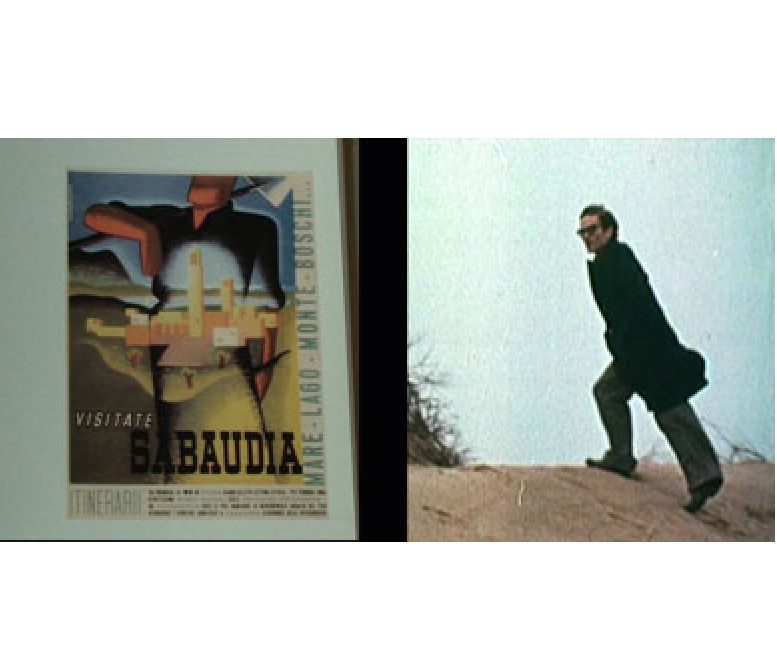Arsenal Cinema, Berlin, Germany
01 Oct 2014 - 03 Oct 2014

NOTES ON PASOLINI'S FORM OF A CITY, 2013
In October, the fourth edition of It all depends takes place as part of the Visionary Archive project. Pier Paolo Pasolini’s APPUNTI PER UN’ORESTIADE AFRICANA (Notes Towards an African Orestes, Italy 1969) will be screened on October 1.
Narrated in the style of a cinematic notebook, Pasolini’s interest in adapting the ancient tragedy for the screen using African actors is mixed with a stubbornly colonial look at realities in Tanzania, Uganda and Ethiopia. The structure of the cinematic notebook and the cultural ideological charge it carries demand that Pasolini’s film be placed in context with two further films. In her video work NOTES ON PASOLINI’S FORM OF A CITY (Germany 2013), Sandra Schäfer examines Pasolini’s projections of Africa before the backdrop of his critique of modernity. We are showing the film on October 3 together with Haile Gerima’s radical social satire MIRT SOST SHI AMIT (Harvest, 3,000 Years, Ethiopia 1975), shot in Ethiopia at the end of Haile Selassie’s rule.
The configuration of the three different film narrations spanning the two evenings brings to light geographical and ideological relationships not without a certain critical tension, which becomes tangible in the images of the landscape, the city and its architecture. The intention here is to invalidate generalizations about African realities and enable cinematic images of concrete places, times and contexts to be talked about instead. The culmination point of the three films is the city of Addis Abeba and the image of what was left behind by Italy’s short colonialization of Ethiopia (1936–1941).
Wed, Oct 1, 8 pm, Arsenal Cinema 2
Guests: Sandra Schäfer, Moderation: Marie-Hélène Gutberlet, Tobias Hering
APPUNTI PER UN’ORESTIADE AFRICANA
(Notes Towards an African Orestes), Pier Paolo Pasolini, Italy 1969, OV/GeS, 73 min
In the style of a cinematic notebook, Pasolini tries his hand at transposing Aeschylus’ Orestes to modern-day Africa and visualizing the parallels between the ancient legend and the young democracies of the African continent. “Africa has arrived at the same turning point in history as Argos in the time of Orestes: at the point of transition from an archaic civilization to democracy” (PPP). Pasolini’s themes and idiosyncrasies become transparent to a greater degree here than in almost all of his other films, as does the occasional blind passion for a “structure that would like to be another structure”, which is how Pasolini once characterized this form of script.
Fri, Oct 1, 7.30 pm, Arsenal Cinema 2
Guests: Sandra Schäfer, Moderation: Marie-Hélène Gutberlet, Tobias Hering
NOTES ON PASOLINI’S FORM OF A CITY, Sandra Schäfer, Germany 2013, OV/EnS, 25 min
MIRT SOST SHI AMIT (Harvest, 3,000 Years), Haile Gerima, Ethiopia 1975, OV/GeS, 138 min
Sandra Schäfer borrows Pasolini’s cinematic notebook approach in order to make a sketch of her own on the form of the city by drawing on Pasolini’s APPUNTI PER UN’ORESTIADE AFRICANA. She re-edits excerpts from Pasolini’s films, comments upon them and expands upon them by adding new material. In Pasolini’s APPUNTI, African students in Rome criticize how Pasolini transposes the Greek Orestes’ understanding of democracy to contemporary Africa. Pasolini traces the interwoven processes of modernization and shows his increasing disappointment about the effects of global capitalism, which in his opinion succeeds in creating uniformity and erasing difference even more radically than Italian fascism.
Haile Gerima emigrated to the US in 1967 and studied at UCLA in Los Angeles together with Charles Burnett, Julie Dash, and Larry Clark. MIRT SOST SHI AMIT, the first film he shot in Ethiopia, takes place during the period of transition between the end of the regime of Haile Selassie and Mengistu Haile Mariam’s rise to power. He uses scenes from the everyday life of a farming family and weaves them together to form a dense picture of the exploitation carried out by the ruling class. Gerima connects here a radical, Frantz Fanon indebted critique with a unconventionally virtuoso visual language which makes the social situation tangible that is brought to life with characters who run the gamut from tragic to insane.
Each edition of It all depends is taken as an opportunity to invite one or two independent authors from the thematic field of the project to write a review. This is intended to create a collection of short text and visual essays that reflect upon both the films seen as well as the event format and the concrete discussions at the Arsenal cinema. The first reviews by Brigitta Kuster and Eckhard Weber on It all depends #2 can be found here.
“Visionary Archive” is funded by the TURN fund of the German Federal Cultural Foundation.
http://www.arsenal-berlin.de/en/living-archive/news/single/article/5080/3082.html